Corporations Law ASIC v Cassimatis (No 8) [2016] FCA 1023
VerifiedAdded on 2023/06/07
|12
|2926
|58
AI Summary
This report discusses the case of ASIC v Cassimatis (No 8) [2016] FCA 1023 and the breach of duties by directors of Storm Financial Limited. It covers the ruling, significance of judgment, and impact on companies in Australia.
Contribute Materials
Your contribution can guide someone’s learning journey. Share your
documents today.
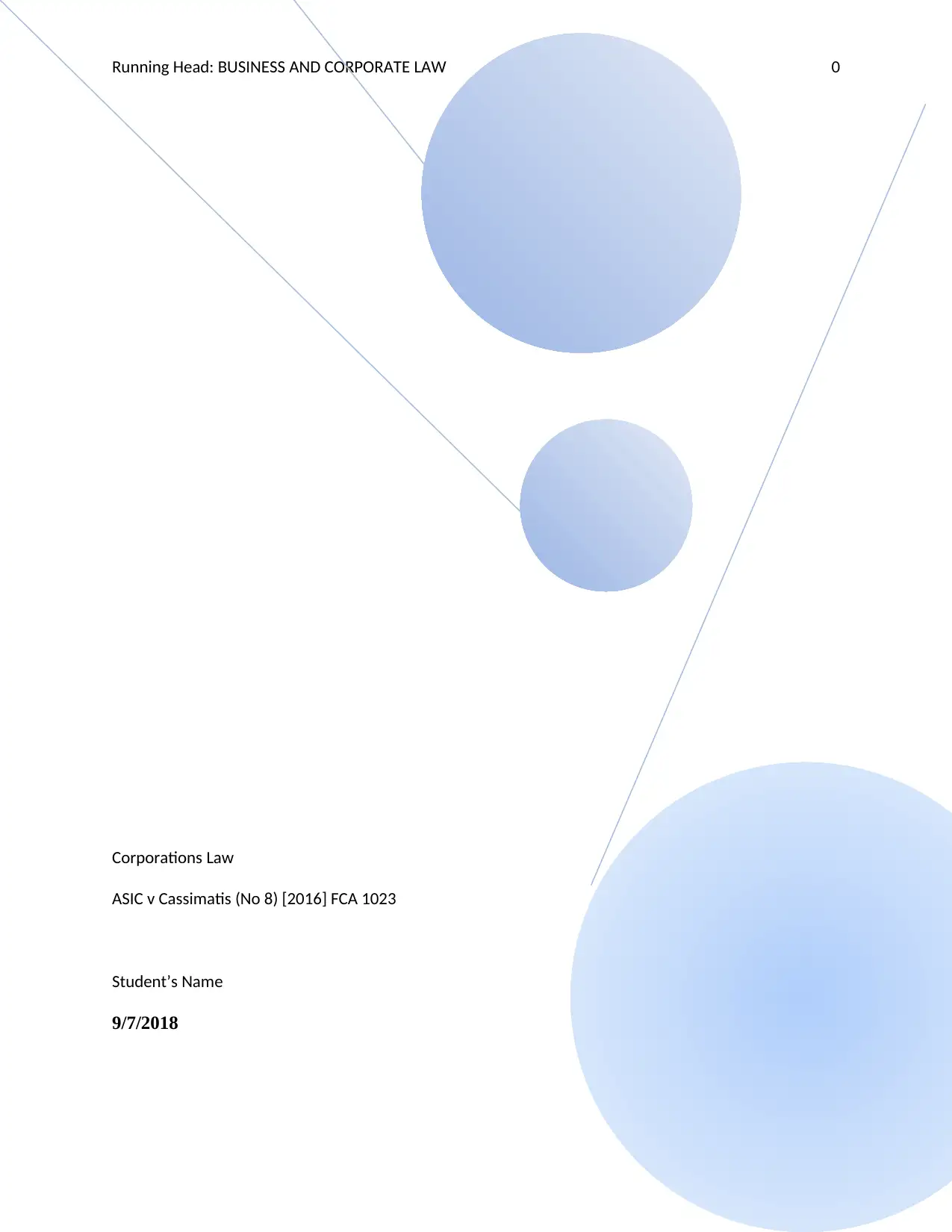
Running Head: BUSINESS AND CORPORATE LAW 0
Corporations Law
ASIC v Cassimatis (No 8) [2016] FCA 1023
Student’s Name
9/7/2018
Corporations Law
ASIC v Cassimatis (No 8) [2016] FCA 1023
Student’s Name
9/7/2018
Secure Best Marks with AI Grader
Need help grading? Try our AI Grader for instant feedback on your assignments.
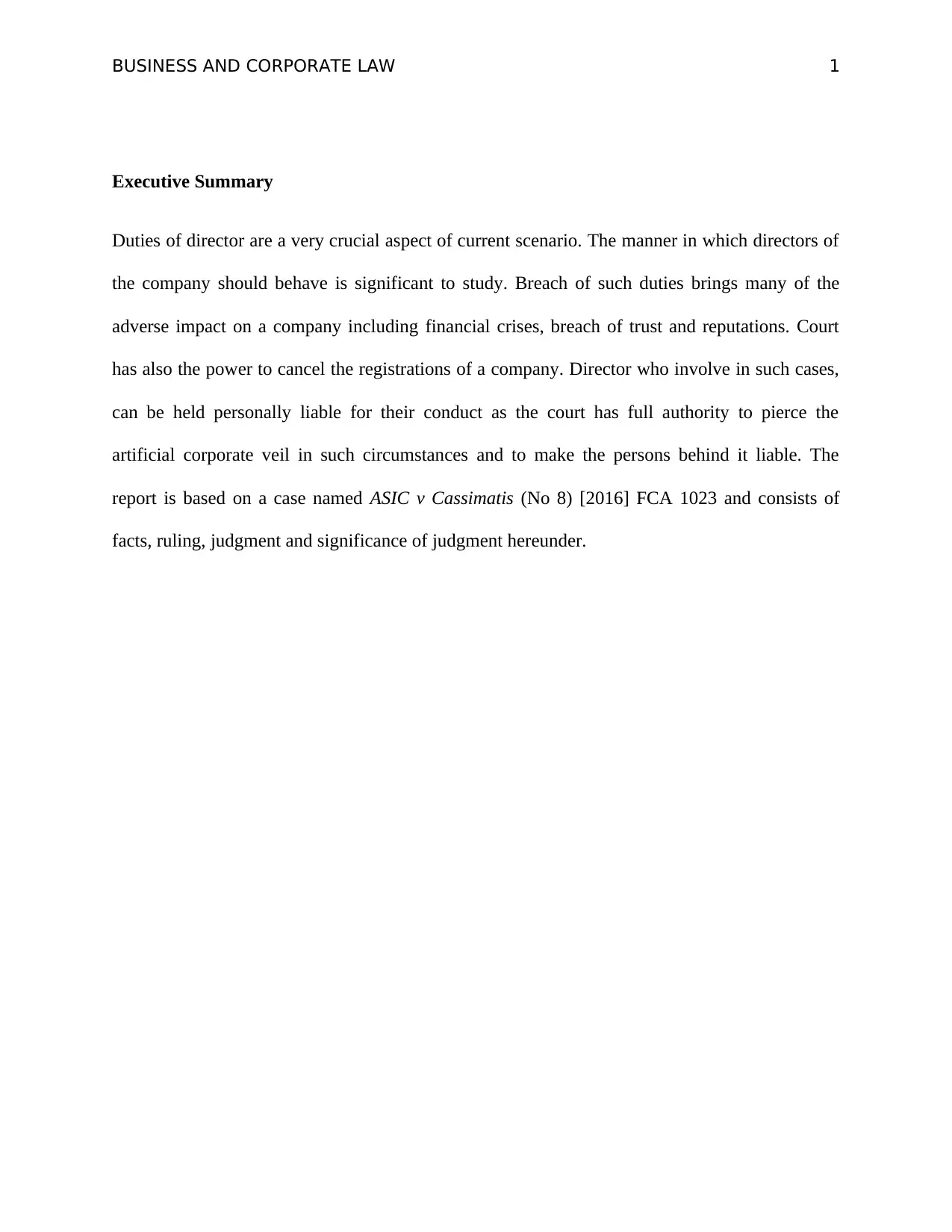
BUSINESS AND CORPORATE LAW 1
Executive Summary
Duties of director are a very crucial aspect of current scenario. The manner in which directors of
the company should behave is significant to study. Breach of such duties brings many of the
adverse impact on a company including financial crises, breach of trust and reputations. Court
has also the power to cancel the registrations of a company. Director who involve in such cases,
can be held personally liable for their conduct as the court has full authority to pierce the
artificial corporate veil in such circumstances and to make the persons behind it liable. The
report is based on a case named ASIC v Cassimatis (No 8) [2016] FCA 1023 and consists of
facts, ruling, judgment and significance of judgment hereunder.
Executive Summary
Duties of director are a very crucial aspect of current scenario. The manner in which directors of
the company should behave is significant to study. Breach of such duties brings many of the
adverse impact on a company including financial crises, breach of trust and reputations. Court
has also the power to cancel the registrations of a company. Director who involve in such cases,
can be held personally liable for their conduct as the court has full authority to pierce the
artificial corporate veil in such circumstances and to make the persons behind it liable. The
report is based on a case named ASIC v Cassimatis (No 8) [2016] FCA 1023 and consists of
facts, ruling, judgment and significance of judgment hereunder.
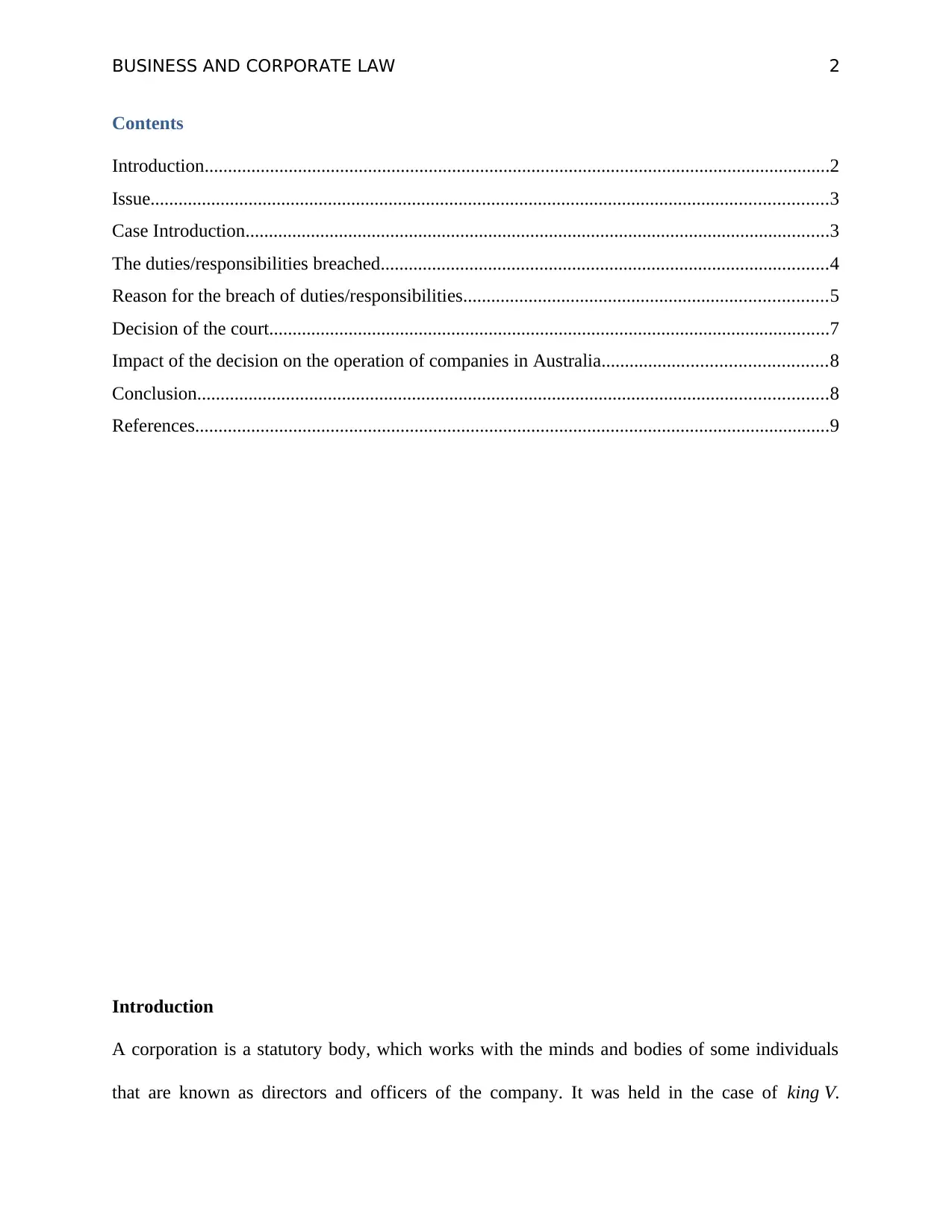
BUSINESS AND CORPORATE LAW 2
Contents
Introduction......................................................................................................................................2
Issue.................................................................................................................................................3
Case Introduction.............................................................................................................................3
The duties/responsibilities breached................................................................................................4
Reason for the breach of duties/responsibilities..............................................................................5
Decision of the court........................................................................................................................7
Impact of the decision on the operation of companies in Australia................................................8
Conclusion.......................................................................................................................................8
References........................................................................................................................................9
Introduction
A corporation is a statutory body, which works with the minds and bodies of some individuals
that are known as directors and officers of the company. It was held in the case of king V.
Contents
Introduction......................................................................................................................................2
Issue.................................................................................................................................................3
Case Introduction.............................................................................................................................3
The duties/responsibilities breached................................................................................................4
Reason for the breach of duties/responsibilities..............................................................................5
Decision of the court........................................................................................................................7
Impact of the decision on the operation of companies in Australia................................................8
Conclusion.......................................................................................................................................8
References........................................................................................................................................9
Introduction
A corporation is a statutory body, which works with the minds and bodies of some individuals
that are known as directors and officers of the company. It was held in the case of king V.
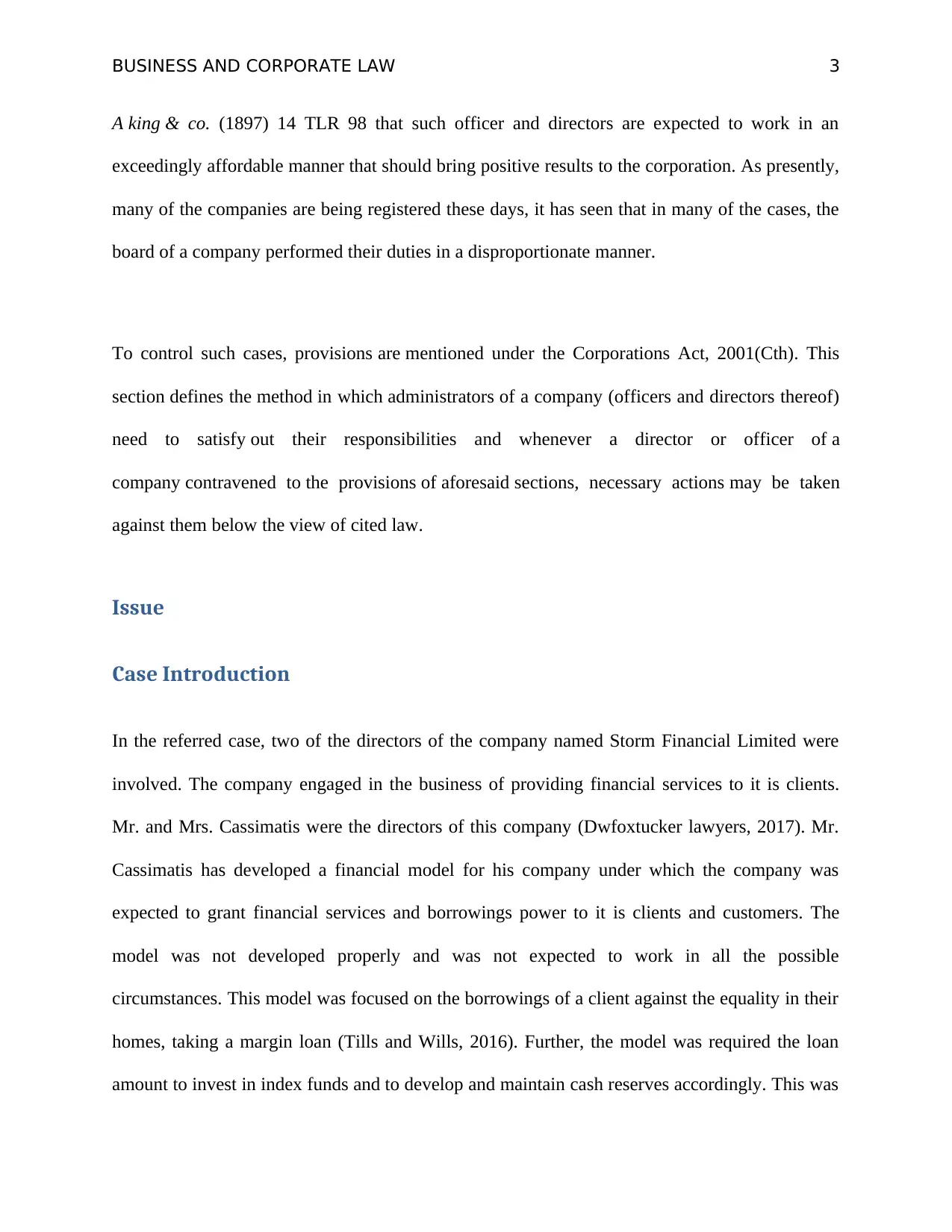
BUSINESS AND CORPORATE LAW 3
A king & co. (1897) 14 TLR 98 that such officer and directors are expected to work in an
exceedingly affordable manner that should bring positive results to the corporation. As presently,
many of the companies are being registered these days, it has seen that in many of the cases, the
board of a company performed their duties in a disproportionate manner.
To control such cases, provisions are mentioned under the Corporations Act, 2001(Cth). This
section defines the method in which administrators of a company (officers and directors thereof)
need to satisfy out their responsibilities and whenever a director or officer of a
company contravened to the provisions of aforesaid sections, necessary actions may be taken
against them below the view of cited law.
Issue
Case Introduction
In the referred case, two of the directors of the company named Storm Financial Limited were
involved. The company engaged in the business of providing financial services to it is clients.
Mr. and Mrs. Cassimatis were the directors of this company (Dwfoxtucker lawyers, 2017). Mr.
Cassimatis has developed a financial model for his company under which the company was
expected to grant financial services and borrowings power to it is clients and customers. The
model was not developed properly and was not expected to work in all the possible
circumstances. This model was focused on the borrowings of a client against the equality in their
homes, taking a margin loan (Tills and Wills, 2016). Further, the model was required the loan
amount to invest in index funds and to develop and maintain cash reserves accordingly. This was
A king & co. (1897) 14 TLR 98 that such officer and directors are expected to work in an
exceedingly affordable manner that should bring positive results to the corporation. As presently,
many of the companies are being registered these days, it has seen that in many of the cases, the
board of a company performed their duties in a disproportionate manner.
To control such cases, provisions are mentioned under the Corporations Act, 2001(Cth). This
section defines the method in which administrators of a company (officers and directors thereof)
need to satisfy out their responsibilities and whenever a director or officer of a
company contravened to the provisions of aforesaid sections, necessary actions may be taken
against them below the view of cited law.
Issue
Case Introduction
In the referred case, two of the directors of the company named Storm Financial Limited were
involved. The company engaged in the business of providing financial services to it is clients.
Mr. and Mrs. Cassimatis were the directors of this company (Dwfoxtucker lawyers, 2017). Mr.
Cassimatis has developed a financial model for his company under which the company was
expected to grant financial services and borrowings power to it is clients and customers. The
model was not developed properly and was not expected to work in all the possible
circumstances. This model was focused on the borrowings of a client against the equality in their
homes, taking a margin loan (Tills and Wills, 2016). Further, the model was required the loan
amount to invest in index funds and to develop and maintain cash reserves accordingly. This was
Paraphrase This Document
Need a fresh take? Get an instant paraphrase of this document with our AI Paraphraser
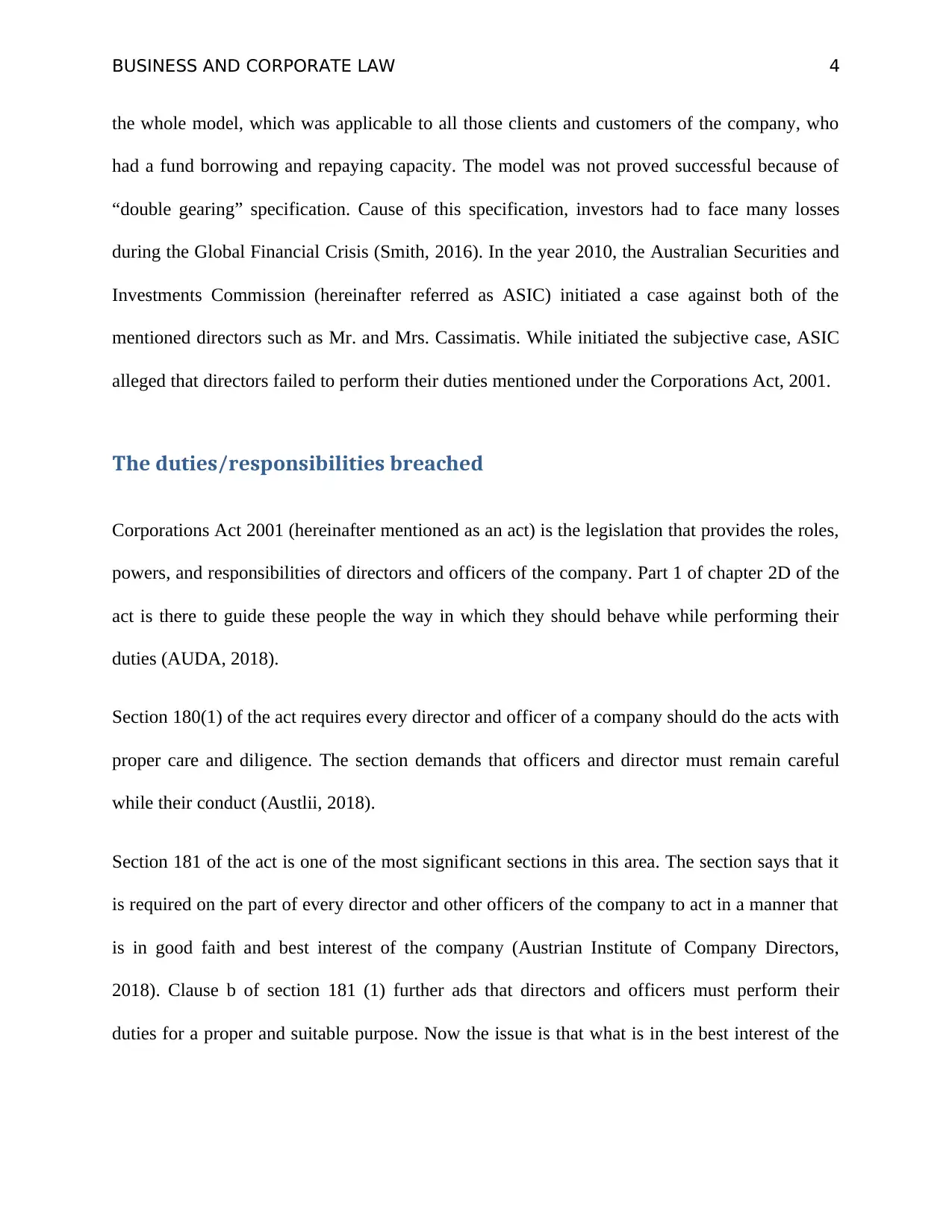
BUSINESS AND CORPORATE LAW 4
the whole model, which was applicable to all those clients and customers of the company, who
had a fund borrowing and repaying capacity. The model was not proved successful because of
“double gearing” specification. Cause of this specification, investors had to face many losses
during the Global Financial Crisis (Smith, 2016). In the year 2010, the Australian Securities and
Investments Commission (hereinafter referred as ASIC) initiated a case against both of the
mentioned directors such as Mr. and Mrs. Cassimatis. While initiated the subjective case, ASIC
alleged that directors failed to perform their duties mentioned under the Corporations Act, 2001.
The duties/responsibilities breached
Corporations Act 2001 (hereinafter mentioned as an act) is the legislation that provides the roles,
powers, and responsibilities of directors and officers of the company. Part 1 of chapter 2D of the
act is there to guide these people the way in which they should behave while performing their
duties (AUDA, 2018).
Section 180(1) of the act requires every director and officer of a company should do the acts with
proper care and diligence. The section demands that officers and director must remain careful
while their conduct (Austlii, 2018).
Section 181 of the act is one of the most significant sections in this area. The section says that it
is required on the part of every director and other officers of the company to act in a manner that
is in good faith and best interest of the company (Austrian Institute of Company Directors,
2018). Clause b of section 181 (1) further ads that directors and officers must perform their
duties for a proper and suitable purpose. Now the issue is that what is in the best interest of the
the whole model, which was applicable to all those clients and customers of the company, who
had a fund borrowing and repaying capacity. The model was not proved successful because of
“double gearing” specification. Cause of this specification, investors had to face many losses
during the Global Financial Crisis (Smith, 2016). In the year 2010, the Australian Securities and
Investments Commission (hereinafter referred as ASIC) initiated a case against both of the
mentioned directors such as Mr. and Mrs. Cassimatis. While initiated the subjective case, ASIC
alleged that directors failed to perform their duties mentioned under the Corporations Act, 2001.
The duties/responsibilities breached
Corporations Act 2001 (hereinafter mentioned as an act) is the legislation that provides the roles,
powers, and responsibilities of directors and officers of the company. Part 1 of chapter 2D of the
act is there to guide these people the way in which they should behave while performing their
duties (AUDA, 2018).
Section 180(1) of the act requires every director and officer of a company should do the acts with
proper care and diligence. The section demands that officers and director must remain careful
while their conduct (Austlii, 2018).
Section 181 of the act is one of the most significant sections in this area. The section says that it
is required on the part of every director and other officers of the company to act in a manner that
is in good faith and best interest of the company (Austrian Institute of Company Directors,
2018). Clause b of section 181 (1) further ads that directors and officers must perform their
duties for a proper and suitable purpose. Now the issue is that what is in the best interest of the
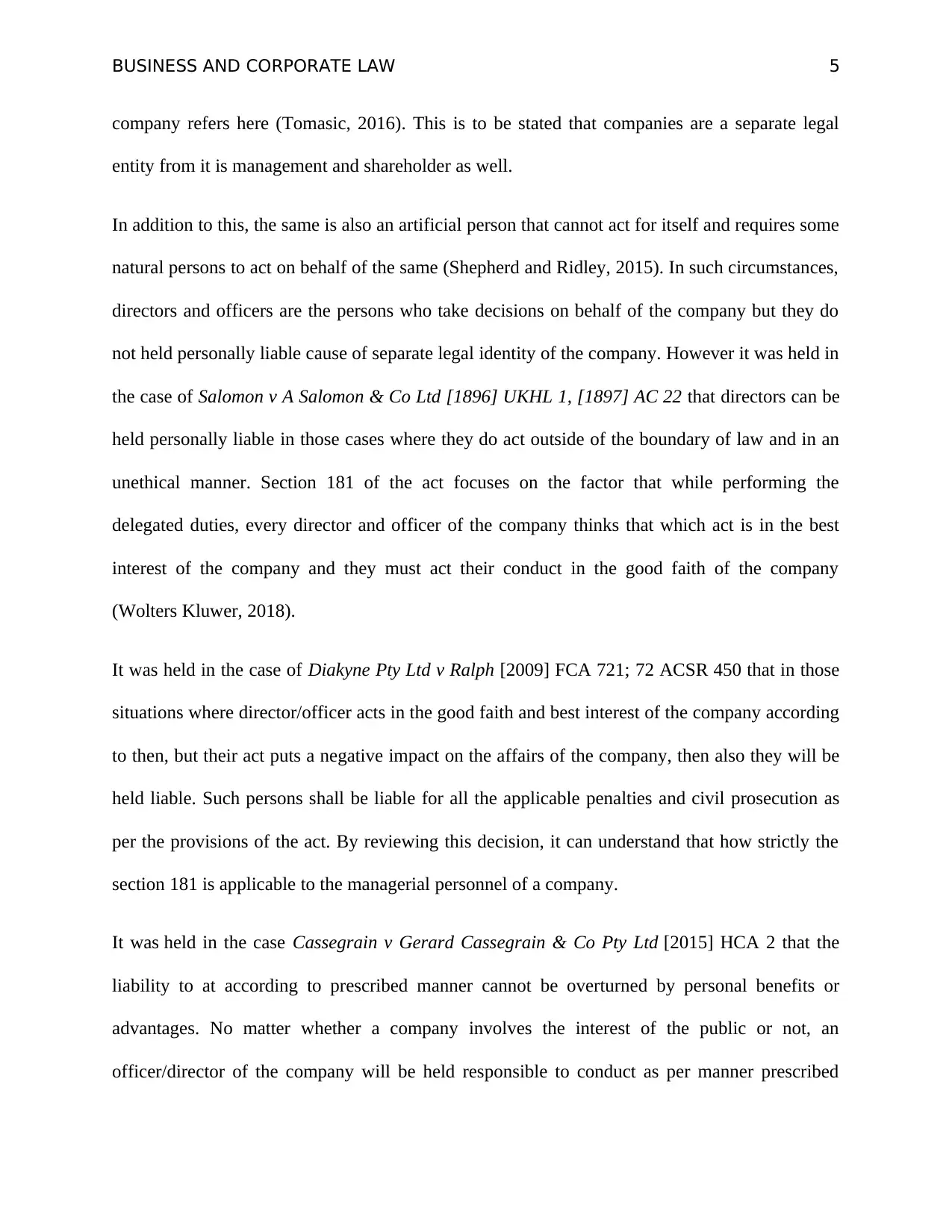
BUSINESS AND CORPORATE LAW 5
company refers here (Tomasic, 2016). This is to be stated that companies are a separate legal
entity from it is management and shareholder as well.
In addition to this, the same is also an artificial person that cannot act for itself and requires some
natural persons to act on behalf of the same (Shepherd and Ridley, 2015). In such circumstances,
directors and officers are the persons who take decisions on behalf of the company but they do
not held personally liable cause of separate legal identity of the company. However it was held in
the case of Salomon v A Salomon & Co Ltd [1896] UKHL 1, [1897] AC 22 that directors can be
held personally liable in those cases where they do act outside of the boundary of law and in an
unethical manner. Section 181 of the act focuses on the factor that while performing the
delegated duties, every director and officer of the company thinks that which act is in the best
interest of the company and they must act their conduct in the good faith of the company
(Wolters Kluwer, 2018).
It was held in the case of Diakyne Pty Ltd v Ralph [2009] FCA 721; 72 ACSR 450 that in those
situations where director/officer acts in the good faith and best interest of the company according
to then, but their act puts a negative impact on the affairs of the company, then also they will be
held liable. Such persons shall be liable for all the applicable penalties and civil prosecution as
per the provisions of the act. By reviewing this decision, it can understand that how strictly the
section 181 is applicable to the managerial personnel of a company.
It was held in the case Cassegrain v Gerard Cassegrain & Co Pty Ltd [2015] HCA 2 that the
liability to at according to prescribed manner cannot be overturned by personal benefits or
advantages. No matter whether a company involves the interest of the public or not, an
officer/director of the company will be held responsible to conduct as per manner prescribed
company refers here (Tomasic, 2016). This is to be stated that companies are a separate legal
entity from it is management and shareholder as well.
In addition to this, the same is also an artificial person that cannot act for itself and requires some
natural persons to act on behalf of the same (Shepherd and Ridley, 2015). In such circumstances,
directors and officers are the persons who take decisions on behalf of the company but they do
not held personally liable cause of separate legal identity of the company. However it was held in
the case of Salomon v A Salomon & Co Ltd [1896] UKHL 1, [1897] AC 22 that directors can be
held personally liable in those cases where they do act outside of the boundary of law and in an
unethical manner. Section 181 of the act focuses on the factor that while performing the
delegated duties, every director and officer of the company thinks that which act is in the best
interest of the company and they must act their conduct in the good faith of the company
(Wolters Kluwer, 2018).
It was held in the case of Diakyne Pty Ltd v Ralph [2009] FCA 721; 72 ACSR 450 that in those
situations where director/officer acts in the good faith and best interest of the company according
to then, but their act puts a negative impact on the affairs of the company, then also they will be
held liable. Such persons shall be liable for all the applicable penalties and civil prosecution as
per the provisions of the act. By reviewing this decision, it can understand that how strictly the
section 181 is applicable to the managerial personnel of a company.
It was held in the case Cassegrain v Gerard Cassegrain & Co Pty Ltd [2015] HCA 2 that the
liability to at according to prescribed manner cannot be overturned by personal benefits or
advantages. No matter whether a company involves the interest of the public or not, an
officer/director of the company will be held responsible to conduct as per manner prescribed
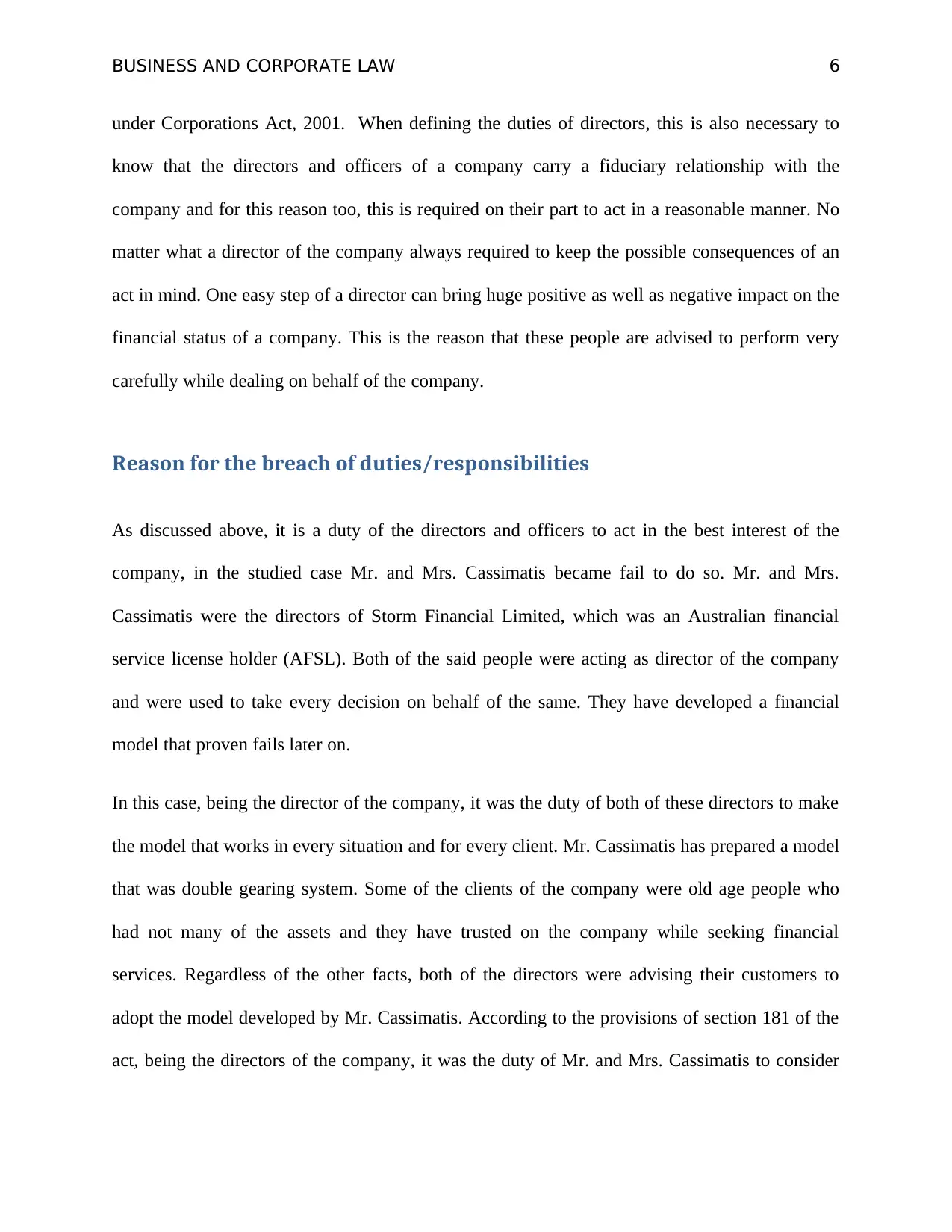
BUSINESS AND CORPORATE LAW 6
under Corporations Act, 2001. When defining the duties of directors, this is also necessary to
know that the directors and officers of a company carry a fiduciary relationship with the
company and for this reason too, this is required on their part to act in a reasonable manner. No
matter what a director of the company always required to keep the possible consequences of an
act in mind. One easy step of a director can bring huge positive as well as negative impact on the
financial status of a company. This is the reason that these people are advised to perform very
carefully while dealing on behalf of the company.
Reason for the breach of duties/responsibilities
As discussed above, it is a duty of the directors and officers to act in the best interest of the
company, in the studied case Mr. and Mrs. Cassimatis became fail to do so. Mr. and Mrs.
Cassimatis were the directors of Storm Financial Limited, which was an Australian financial
service license holder (AFSL). Both of the said people were acting as director of the company
and were used to take every decision on behalf of the same. They have developed a financial
model that proven fails later on.
In this case, being the director of the company, it was the duty of both of these directors to make
the model that works in every situation and for every client. Mr. Cassimatis has prepared a model
that was double gearing system. Some of the clients of the company were old age people who
had not many of the assets and they have trusted on the company while seeking financial
services. Regardless of the other facts, both of the directors were advising their customers to
adopt the model developed by Mr. Cassimatis. According to the provisions of section 181 of the
act, being the directors of the company, it was the duty of Mr. and Mrs. Cassimatis to consider
under Corporations Act, 2001. When defining the duties of directors, this is also necessary to
know that the directors and officers of a company carry a fiduciary relationship with the
company and for this reason too, this is required on their part to act in a reasonable manner. No
matter what a director of the company always required to keep the possible consequences of an
act in mind. One easy step of a director can bring huge positive as well as negative impact on the
financial status of a company. This is the reason that these people are advised to perform very
carefully while dealing on behalf of the company.
Reason for the breach of duties/responsibilities
As discussed above, it is a duty of the directors and officers to act in the best interest of the
company, in the studied case Mr. and Mrs. Cassimatis became fail to do so. Mr. and Mrs.
Cassimatis were the directors of Storm Financial Limited, which was an Australian financial
service license holder (AFSL). Both of the said people were acting as director of the company
and were used to take every decision on behalf of the same. They have developed a financial
model that proven fails later on.
In this case, being the director of the company, it was the duty of both of these directors to make
the model that works in every situation and for every client. Mr. Cassimatis has prepared a model
that was double gearing system. Some of the clients of the company were old age people who
had not many of the assets and they have trusted on the company while seeking financial
services. Regardless of the other facts, both of the directors were advising their customers to
adopt the model developed by Mr. Cassimatis. According to the provisions of section 181 of the
act, being the directors of the company, it was the duty of Mr. and Mrs. Cassimatis to consider
Secure Best Marks with AI Grader
Need help grading? Try our AI Grader for instant feedback on your assignments.
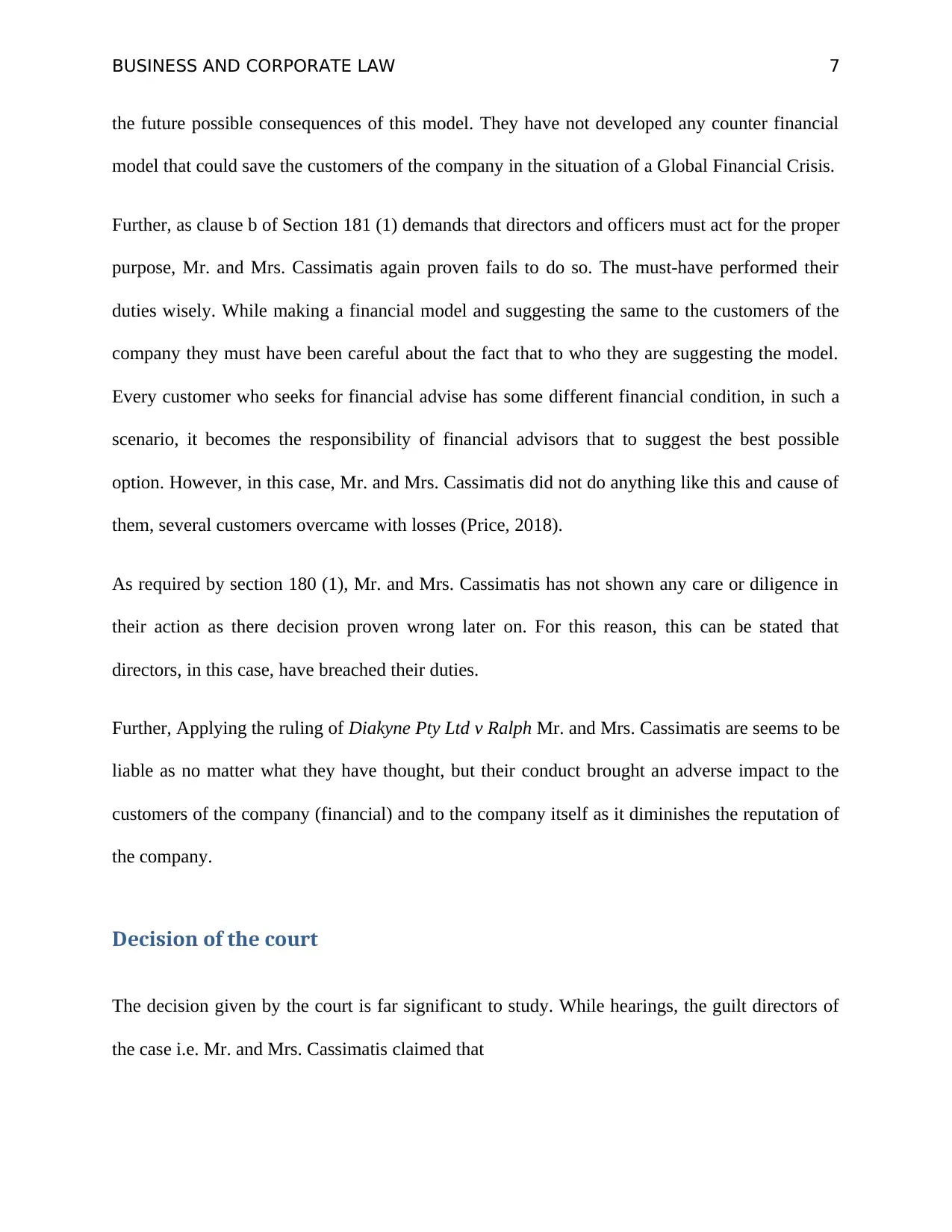
BUSINESS AND CORPORATE LAW 7
the future possible consequences of this model. They have not developed any counter financial
model that could save the customers of the company in the situation of a Global Financial Crisis.
Further, as clause b of Section 181 (1) demands that directors and officers must act for the proper
purpose, Mr. and Mrs. Cassimatis again proven fails to do so. The must-have performed their
duties wisely. While making a financial model and suggesting the same to the customers of the
company they must have been careful about the fact that to who they are suggesting the model.
Every customer who seeks for financial advise has some different financial condition, in such a
scenario, it becomes the responsibility of financial advisors that to suggest the best possible
option. However, in this case, Mr. and Mrs. Cassimatis did not do anything like this and cause of
them, several customers overcame with losses (Price, 2018).
As required by section 180 (1), Mr. and Mrs. Cassimatis has not shown any care or diligence in
their action as there decision proven wrong later on. For this reason, this can be stated that
directors, in this case, have breached their duties.
Further, Applying the ruling of Diakyne Pty Ltd v Ralph Mr. and Mrs. Cassimatis are seems to be
liable as no matter what they have thought, but their conduct brought an adverse impact to the
customers of the company (financial) and to the company itself as it diminishes the reputation of
the company.
Decision of the court
The decision given by the court is far significant to study. While hearings, the guilt directors of
the case i.e. Mr. and Mrs. Cassimatis claimed that
the future possible consequences of this model. They have not developed any counter financial
model that could save the customers of the company in the situation of a Global Financial Crisis.
Further, as clause b of Section 181 (1) demands that directors and officers must act for the proper
purpose, Mr. and Mrs. Cassimatis again proven fails to do so. The must-have performed their
duties wisely. While making a financial model and suggesting the same to the customers of the
company they must have been careful about the fact that to who they are suggesting the model.
Every customer who seeks for financial advise has some different financial condition, in such a
scenario, it becomes the responsibility of financial advisors that to suggest the best possible
option. However, in this case, Mr. and Mrs. Cassimatis did not do anything like this and cause of
them, several customers overcame with losses (Price, 2018).
As required by section 180 (1), Mr. and Mrs. Cassimatis has not shown any care or diligence in
their action as there decision proven wrong later on. For this reason, this can be stated that
directors, in this case, have breached their duties.
Further, Applying the ruling of Diakyne Pty Ltd v Ralph Mr. and Mrs. Cassimatis are seems to be
liable as no matter what they have thought, but their conduct brought an adverse impact to the
customers of the company (financial) and to the company itself as it diminishes the reputation of
the company.
Decision of the court
The decision given by the court is far significant to study. While hearings, the guilt directors of
the case i.e. Mr. and Mrs. Cassimatis claimed that
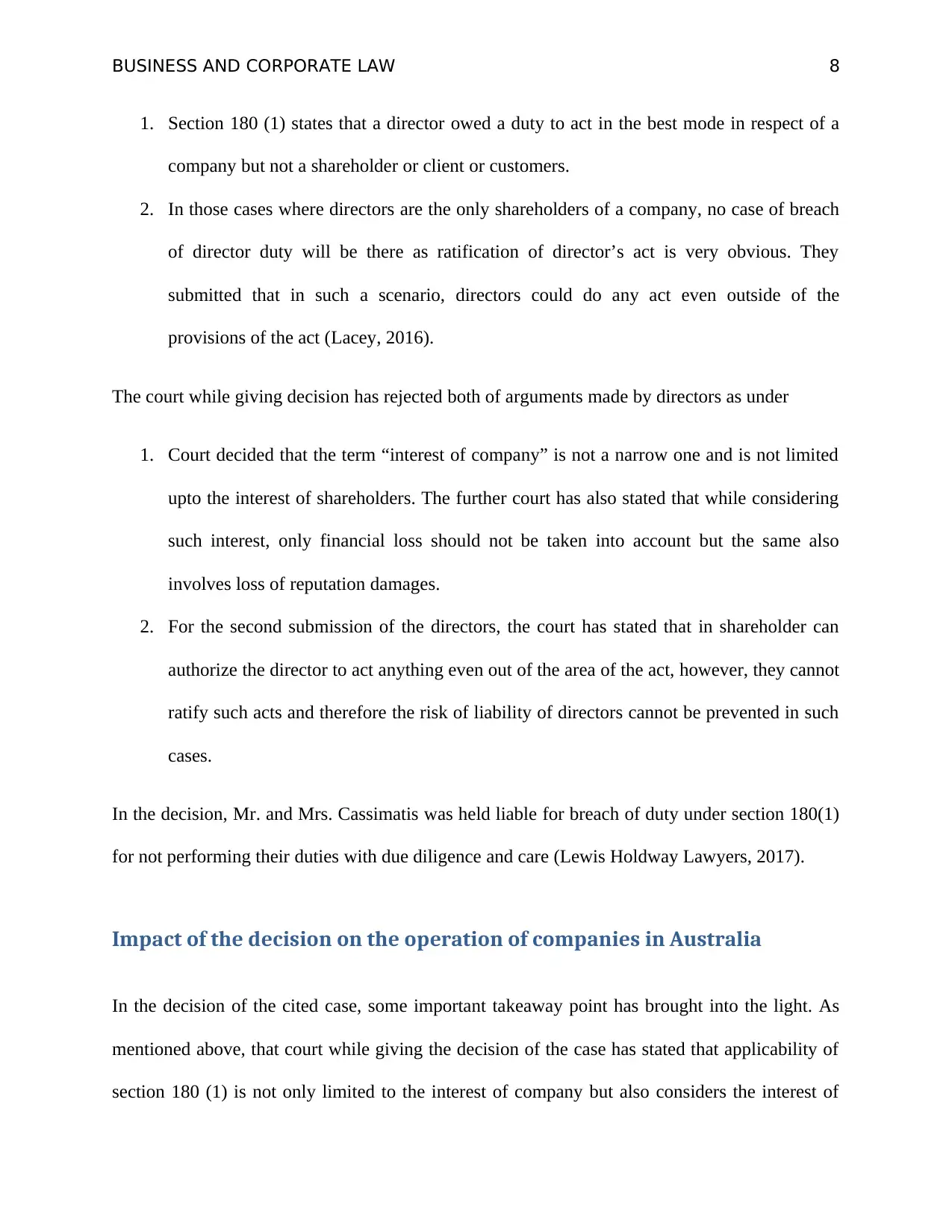
BUSINESS AND CORPORATE LAW 8
1. Section 180 (1) states that a director owed a duty to act in the best mode in respect of a
company but not a shareholder or client or customers.
2. In those cases where directors are the only shareholders of a company, no case of breach
of director duty will be there as ratification of director’s act is very obvious. They
submitted that in such a scenario, directors could do any act even outside of the
provisions of the act (Lacey, 2016).
The court while giving decision has rejected both of arguments made by directors as under
1. Court decided that the term “interest of company” is not a narrow one and is not limited
upto the interest of shareholders. The further court has also stated that while considering
such interest, only financial loss should not be taken into account but the same also
involves loss of reputation damages.
2. For the second submission of the directors, the court has stated that in shareholder can
authorize the director to act anything even out of the area of the act, however, they cannot
ratify such acts and therefore the risk of liability of directors cannot be prevented in such
cases.
In the decision, Mr. and Mrs. Cassimatis was held liable for breach of duty under section 180(1)
for not performing their duties with due diligence and care (Lewis Holdway Lawyers, 2017).
Impact of the decision on the operation of companies in Australia
In the decision of the cited case, some important takeaway point has brought into the light. As
mentioned above, that court while giving the decision of the case has stated that applicability of
section 180 (1) is not only limited to the interest of company but also considers the interest of
1. Section 180 (1) states that a director owed a duty to act in the best mode in respect of a
company but not a shareholder or client or customers.
2. In those cases where directors are the only shareholders of a company, no case of breach
of director duty will be there as ratification of director’s act is very obvious. They
submitted that in such a scenario, directors could do any act even outside of the
provisions of the act (Lacey, 2016).
The court while giving decision has rejected both of arguments made by directors as under
1. Court decided that the term “interest of company” is not a narrow one and is not limited
upto the interest of shareholders. The further court has also stated that while considering
such interest, only financial loss should not be taken into account but the same also
involves loss of reputation damages.
2. For the second submission of the directors, the court has stated that in shareholder can
authorize the director to act anything even out of the area of the act, however, they cannot
ratify such acts and therefore the risk of liability of directors cannot be prevented in such
cases.
In the decision, Mr. and Mrs. Cassimatis was held liable for breach of duty under section 180(1)
for not performing their duties with due diligence and care (Lewis Holdway Lawyers, 2017).
Impact of the decision on the operation of companies in Australia
In the decision of the cited case, some important takeaway point has brought into the light. As
mentioned above, that court while giving the decision of the case has stated that applicability of
section 180 (1) is not only limited to the interest of company but also considers the interest of
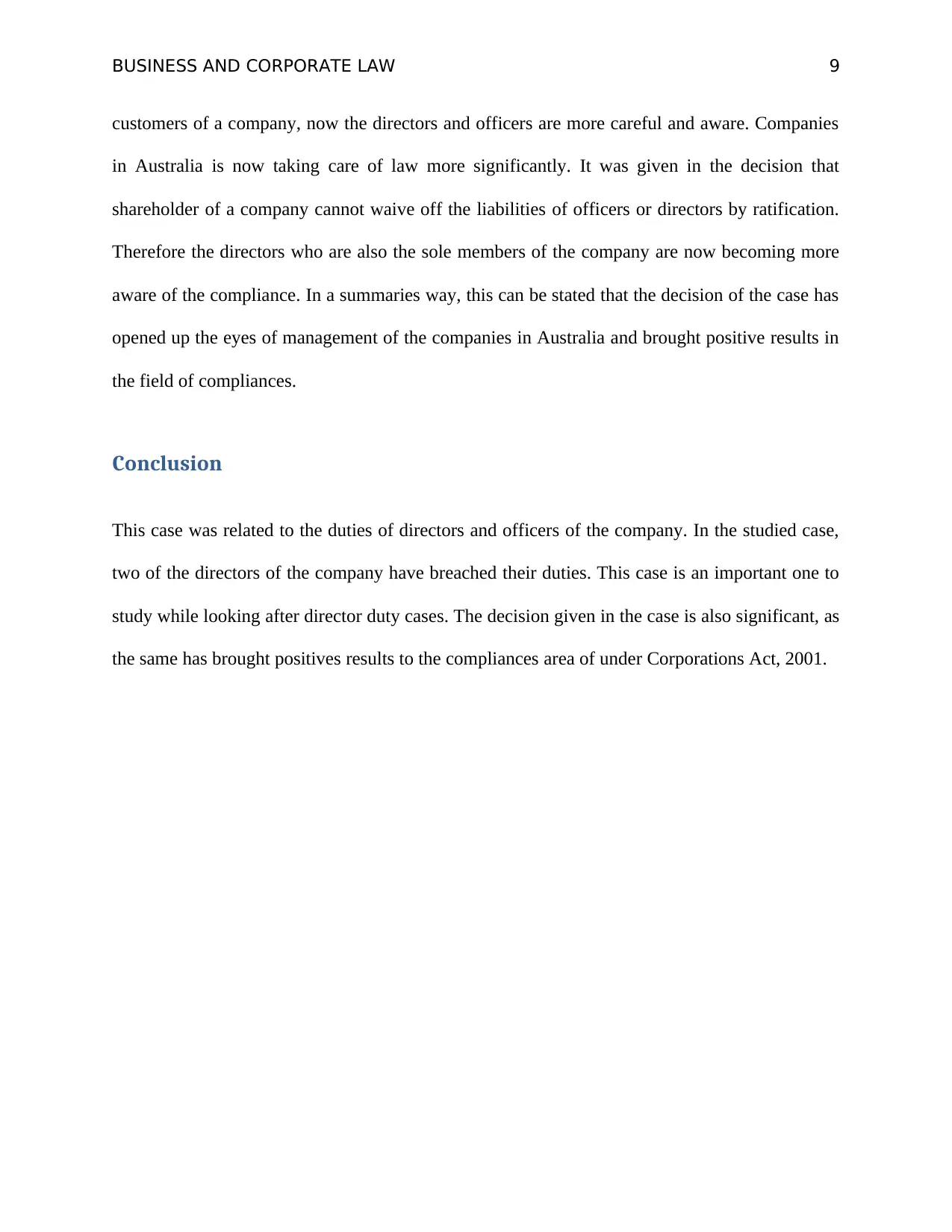
BUSINESS AND CORPORATE LAW 9
customers of a company, now the directors and officers are more careful and aware. Companies
in Australia is now taking care of law more significantly. It was given in the decision that
shareholder of a company cannot waive off the liabilities of officers or directors by ratification.
Therefore the directors who are also the sole members of the company are now becoming more
aware of the compliance. In a summaries way, this can be stated that the decision of the case has
opened up the eyes of management of the companies in Australia and brought positive results in
the field of compliances.
Conclusion
This case was related to the duties of directors and officers of the company. In the studied case,
two of the directors of the company have breached their duties. This case is an important one to
study while looking after director duty cases. The decision given in the case is also significant, as
the same has brought positives results to the compliances area of under Corporations Act, 2001.
customers of a company, now the directors and officers are more careful and aware. Companies
in Australia is now taking care of law more significantly. It was given in the decision that
shareholder of a company cannot waive off the liabilities of officers or directors by ratification.
Therefore the directors who are also the sole members of the company are now becoming more
aware of the compliance. In a summaries way, this can be stated that the decision of the case has
opened up the eyes of management of the companies in Australia and brought positive results in
the field of compliances.
Conclusion
This case was related to the duties of directors and officers of the company. In the studied case,
two of the directors of the company have breached their duties. This case is an important one to
study while looking after director duty cases. The decision given in the case is also significant, as
the same has brought positives results to the compliances area of under Corporations Act, 2001.
Paraphrase This Document
Need a fresh take? Get an instant paraphrase of this document with our AI Paraphraser
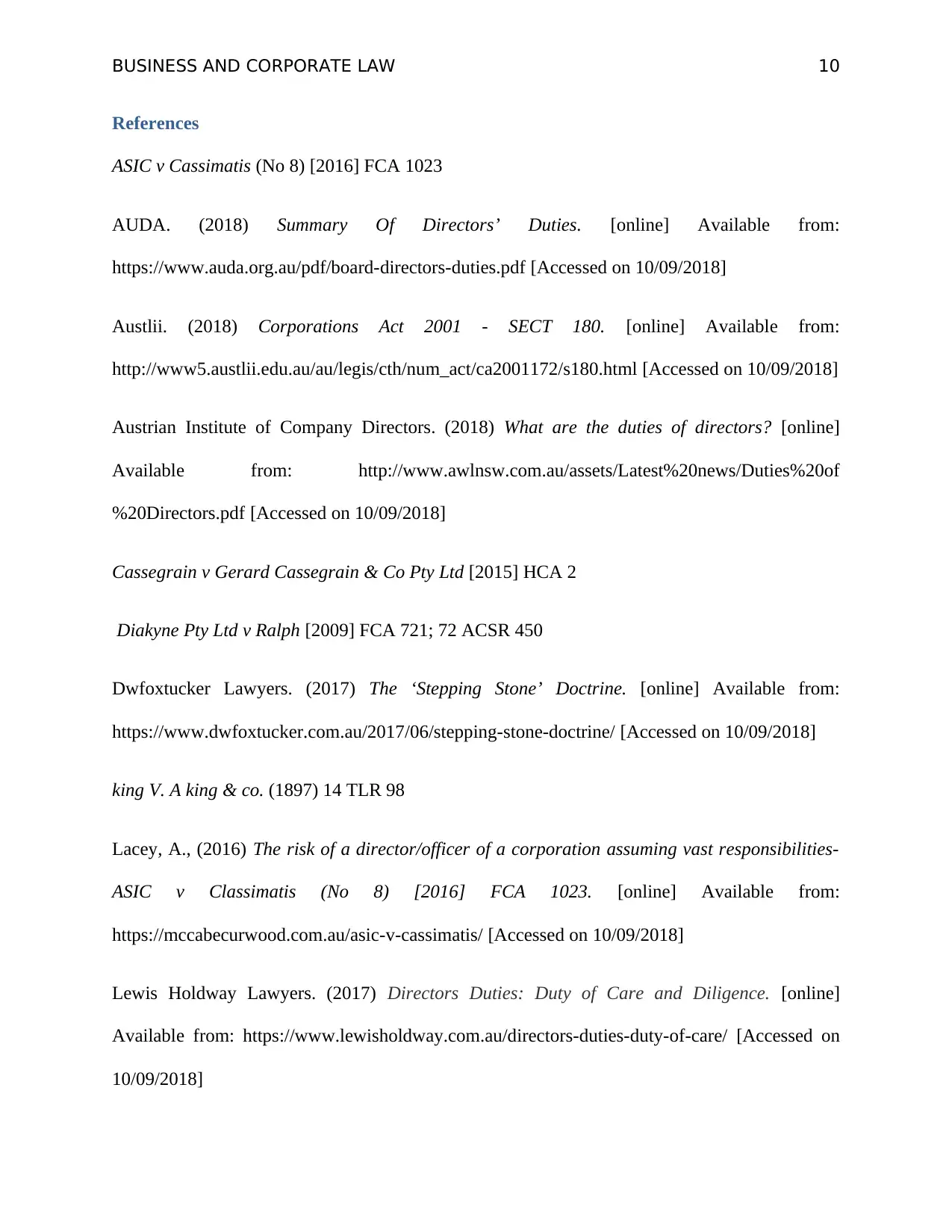
BUSINESS AND CORPORATE LAW 10
References
ASIC v Cassimatis (No 8) [2016] FCA 1023
AUDA. (2018) Summary Of Directors’ Duties. [online] Available from:
https://www.auda.org.au/pdf/board-directors-duties.pdf [Accessed on 10/09/2018]
Austlii. (2018) Corporations Act 2001 - SECT 180. [online] Available from:
http://www5.austlii.edu.au/au/legis/cth/num_act/ca2001172/s180.html [Accessed on 10/09/2018]
Austrian Institute of Company Directors. (2018) What are the duties of directors? [online]
Available from: http://www.awlnsw.com.au/assets/Latest%20news/Duties%20of
%20Directors.pdf [Accessed on 10/09/2018]
Cassegrain v Gerard Cassegrain & Co Pty Ltd [2015] HCA 2
Diakyne Pty Ltd v Ralph [2009] FCA 721; 72 ACSR 450
Dwfoxtucker Lawyers. (2017) The ‘Stepping Stone’ Doctrine. [online] Available from:
https://www.dwfoxtucker.com.au/2017/06/stepping-stone-doctrine/ [Accessed on 10/09/2018]
king V. A king & co. (1897) 14 TLR 98
Lacey, A., (2016) The risk of a director/officer of a corporation assuming vast responsibilities-
ASIC v Classimatis (No 8) [2016] FCA 1023. [online] Available from:
https://mccabecurwood.com.au/asic-v-cassimatis/ [Accessed on 10/09/2018]
Lewis Holdway Lawyers. (2017) Directors Duties: Duty of Care and Diligence. [online]
Available from: https://www.lewisholdway.com.au/directors-duties-duty-of-care/ [Accessed on
10/09/2018]
References
ASIC v Cassimatis (No 8) [2016] FCA 1023
AUDA. (2018) Summary Of Directors’ Duties. [online] Available from:
https://www.auda.org.au/pdf/board-directors-duties.pdf [Accessed on 10/09/2018]
Austlii. (2018) Corporations Act 2001 - SECT 180. [online] Available from:
http://www5.austlii.edu.au/au/legis/cth/num_act/ca2001172/s180.html [Accessed on 10/09/2018]
Austrian Institute of Company Directors. (2018) What are the duties of directors? [online]
Available from: http://www.awlnsw.com.au/assets/Latest%20news/Duties%20of
%20Directors.pdf [Accessed on 10/09/2018]
Cassegrain v Gerard Cassegrain & Co Pty Ltd [2015] HCA 2
Diakyne Pty Ltd v Ralph [2009] FCA 721; 72 ACSR 450
Dwfoxtucker Lawyers. (2017) The ‘Stepping Stone’ Doctrine. [online] Available from:
https://www.dwfoxtucker.com.au/2017/06/stepping-stone-doctrine/ [Accessed on 10/09/2018]
king V. A king & co. (1897) 14 TLR 98
Lacey, A., (2016) The risk of a director/officer of a corporation assuming vast responsibilities-
ASIC v Classimatis (No 8) [2016] FCA 1023. [online] Available from:
https://mccabecurwood.com.au/asic-v-cassimatis/ [Accessed on 10/09/2018]
Lewis Holdway Lawyers. (2017) Directors Duties: Duty of Care and Diligence. [online]
Available from: https://www.lewisholdway.com.au/directors-duties-duty-of-care/ [Accessed on
10/09/2018]
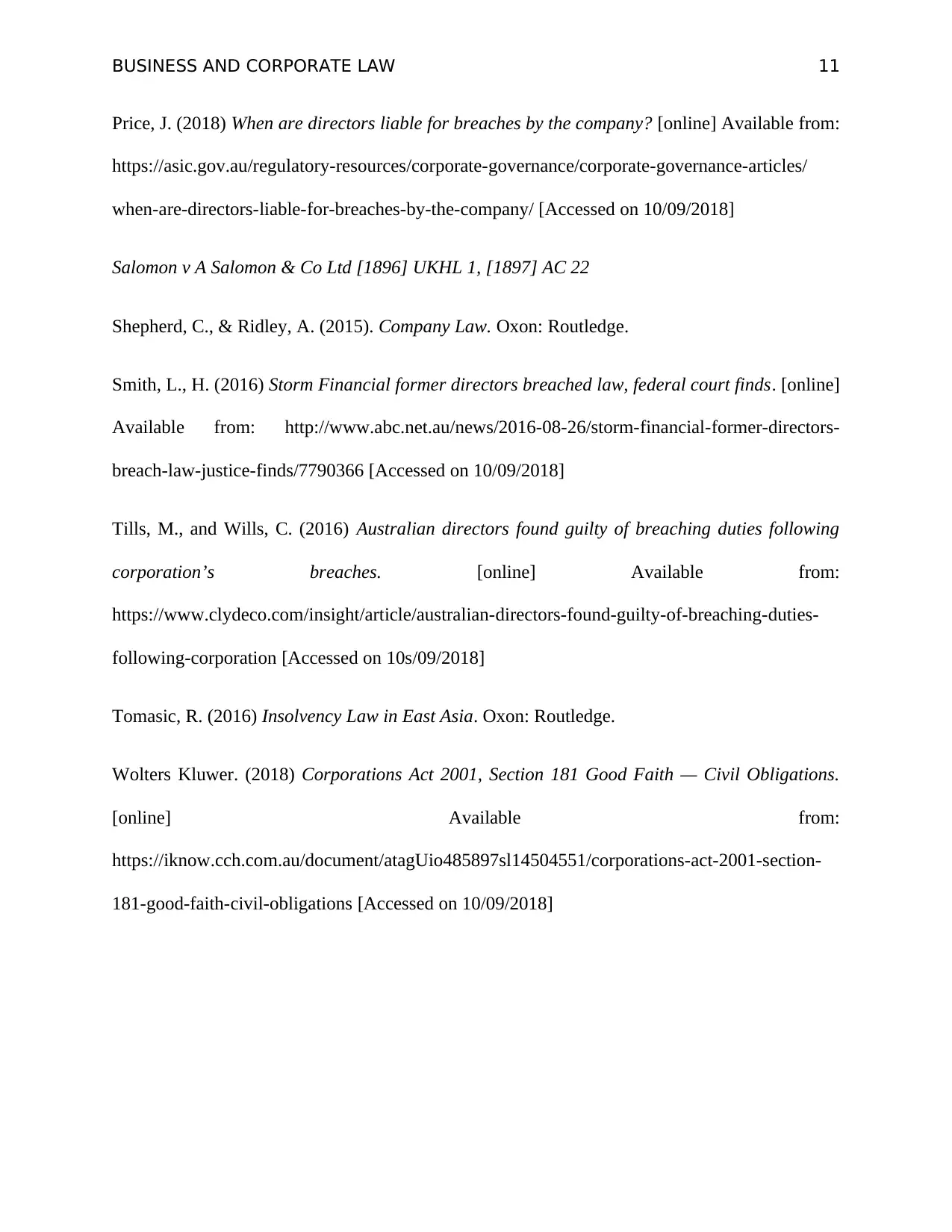
BUSINESS AND CORPORATE LAW 11
Price, J. (2018) When are directors liable for breaches by the company? [online] Available from:
https://asic.gov.au/regulatory-resources/corporate-governance/corporate-governance-articles/
when-are-directors-liable-for-breaches-by-the-company/ [Accessed on 10/09/2018]
Salomon v A Salomon & Co Ltd [1896] UKHL 1, [1897] AC 22
Shepherd, C., & Ridley, A. (2015). Company Law. Oxon: Routledge.
Smith, L., H. (2016) Storm Financial former directors breached law, federal court finds. [online]
Available from: http://www.abc.net.au/news/2016-08-26/storm-financial-former-directors-
breach-law-justice-finds/7790366 [Accessed on 10/09/2018]
Tills, M., and Wills, C. (2016) Australian directors found guilty of breaching duties following
corporation’s breaches. [online] Available from:
https://www.clydeco.com/insight/article/australian-directors-found-guilty-of-breaching-duties-
following-corporation [Accessed on 10s/09/2018]
Tomasic, R. (2016) Insolvency Law in East Asia. Oxon: Routledge.
Wolters Kluwer. (2018) Corporations Act 2001, Section 181 Good Faith — Civil Obligations.
[online] Available from:
https://iknow.cch.com.au/document/atagUio485897sl14504551/corporations-act-2001-section-
181-good-faith-civil-obligations [Accessed on 10/09/2018]
Price, J. (2018) When are directors liable for breaches by the company? [online] Available from:
https://asic.gov.au/regulatory-resources/corporate-governance/corporate-governance-articles/
when-are-directors-liable-for-breaches-by-the-company/ [Accessed on 10/09/2018]
Salomon v A Salomon & Co Ltd [1896] UKHL 1, [1897] AC 22
Shepherd, C., & Ridley, A. (2015). Company Law. Oxon: Routledge.
Smith, L., H. (2016) Storm Financial former directors breached law, federal court finds. [online]
Available from: http://www.abc.net.au/news/2016-08-26/storm-financial-former-directors-
breach-law-justice-finds/7790366 [Accessed on 10/09/2018]
Tills, M., and Wills, C. (2016) Australian directors found guilty of breaching duties following
corporation’s breaches. [online] Available from:
https://www.clydeco.com/insight/article/australian-directors-found-guilty-of-breaching-duties-
following-corporation [Accessed on 10s/09/2018]
Tomasic, R. (2016) Insolvency Law in East Asia. Oxon: Routledge.
Wolters Kluwer. (2018) Corporations Act 2001, Section 181 Good Faith — Civil Obligations.
[online] Available from:
https://iknow.cch.com.au/document/atagUio485897sl14504551/corporations-act-2001-section-
181-good-faith-civil-obligations [Accessed on 10/09/2018]
1 out of 12
Related Documents
Your All-in-One AI-Powered Toolkit for Academic Success.
+13062052269
info@desklib.com
Available 24*7 on WhatsApp / Email
![[object Object]](/_next/static/media/star-bottom.7253800d.svg)
Unlock your academic potential
© 2024 | Zucol Services PVT LTD | All rights reserved.





